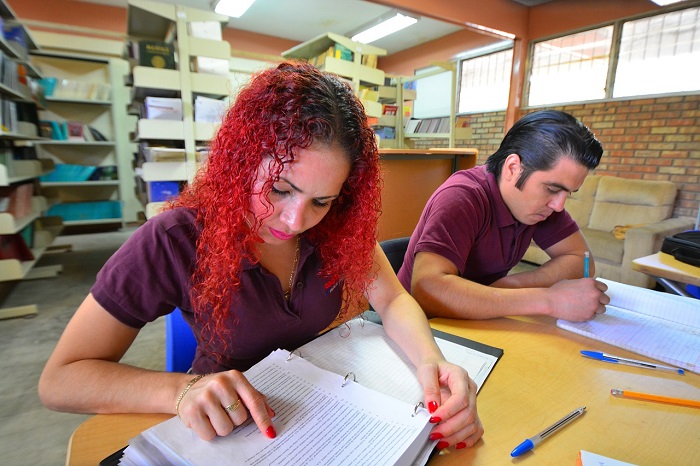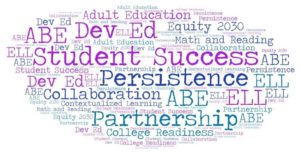Dev Ed/ABE Toolkit

A Toolkit for Forming and Sustaining Dev Ed and ABE Partnerships: Enhancing Student Success
This resource has been created by MDE-ABE Northwest Transitions Region with Successful Minnesota State Dev Ed Partnerships and is licensed under Creative Commons CC by NC 4.0 International, © 2021. Readers may distribute, remix, adapt, and build upon the material in any medium or format for noncommercial purposes only, and must provide attribution to the creator.
Target Audience: Adult Basic Education Practitioners, Minnesota State Campus Faculty, College and ABE Administrators, State Level Administrators, and anyone with interests to improve Developmental Education student outcomes
Additional Dev Ed/ABE Partnership Resources: Check out the Dev Ed/ABE Partnerships page on this website for more resources and information.
Toolkit Navigation
- Access the full Toolkit (PDF)
- Access Toolkit chapter synopses: follow links at the bottom of this page
Abstract
Nationwide, colleges are designing and piloting strategies to accelerate students’ progress through developmental education (Dev Ed, see Glossary) and into college-level coursework. And while many practices are gaining traction with practitioners and policymakers, there is still quite a ways to go to close the equity gap by supporting more institutions and individuals to adopt and utilize effective partnership practices that address persistent barriers.
Furthermore, in 2017, the Minnesota legislature passed legislation that required the Minnesota State Board of Trustees to prepare a plan to reform developmental education offerings at their 37 system campuses aimed at reducing the number of students placed, and the time spent in developmental education. The Developmental Education Strategic Roadmap (DESR) outlines Minnesota State’s plan for re-imagining and redesigning developmental education to significantly increase the success of all students in developmental education and college-level gateway courses towards an increase of overall college degree, certificate, or diploma completion. [Source: Developmental Education Strategic Roadmap]
 Each campus in the Minnesota State system is uniquely responsible for implementing the changes needed in developmental education to meet the goals of the DESR listed above. One methodology has emerged at various Minnesota State institutions in the past several years demonstrating significant improvement in the success of students in dev ed and college-level gateway courses. The model utilizes collaborative teaching models involving development education faculty and adult basic education instructors.
Each campus in the Minnesota State system is uniquely responsible for implementing the changes needed in developmental education to meet the goals of the DESR listed above. One methodology has emerged at various Minnesota State institutions in the past several years demonstrating significant improvement in the success of students in dev ed and college-level gateway courses. The model utilizes collaborative teaching models involving development education faculty and adult basic education instructors.
However, until now, there has not been a readily accessible means for people across the state interested in learning how to implement such a model, to learn from colleagues who have experienced collaboration success. These individuals have provided their expertise, working collaboratively to improve student success in ways that help increase student confidence, improve academic competence, and gain the skills needed for college and career readiness.
Benefits and Uses
This Toolkit serves as a useful resource to help train and support campuses and Adult Education programs in a simplified, straightforward way, providing ideas and resources for beginning a Dev Ed/ABE partnership, or improving an existing partnership.
This toolkit has been developed specifically for practitioners within the Minnesota State system and Minnesota Adult Basic Education (ABE). However, the practices and information contained in this Toolkit should assist anyone regardless of their campus or Adult Education program location. Feel free to use the toolkit in whatever way works best for your environment.
The Dev Ed/ABE collaborative teaching model has emerged at various Minnesota State institutions in the past several years, demonstrating significant improvement in the success of students in dev ed and college-level gateway courses.
What’s in the Toolkit
Much of the content has been authored by subject matter experts throughout Minnesota reflecting the voices of campus faculty and administrators, as well as ABE instructors and program administrators. Below, you will find descriptions of, and links to, each chapter.
- Access the full Toolkit (PDF)
- Access Toolkit chapter synopses: follow links below
Preface
Introducing the Toolkit
This section provides more in-depth background on the rationale, contributors, and development of the Toolkit, as well as information on the intended audience, contents, and use of the Toolkit.
Chapter 1
Context and Introduction to the Dev Ed/ABE Model
This chapter provides the context and an introduction to the Dev/ED ABE Model, discusses proven success to date of existing Minnesota partnerships, names the most prevalent barriers to forming partnerships, identifies best practices common to all successful partnerships, makes a distinction in roles between the college faculty member and the ABE instructor, and discusses the relationship of the Dev Ed/ABE model to equity.
Chapter 2
Creating a Dev Ed/ABE Partnership
This chapter includes such things as how to get started, finding administration support, which classes lend themselves best to partnering, selecting faculty and instructors to partner together, the need to define roles, the importance of advance planning, how partnerships evaluate themselves and tweak things over time, and the documenting of results.
The chapter is split into 3 parts.
Chapter 3
Types of Partnership Models/Levels of Collaboration
This chapter outlines the various forms of teaching in a partnership, listing what we are calling the levels of partner integration, from shallower, or a lighter touch ABE presence, to a deeper one, where ABE has a more integrated role with dev ed students, allowing for a greater amount of tailored and contextualized learning (see Glossary).
Chapter 4
Stories from the Field
The Stories from the Field chapter is where you can read how four of the existing Dev Ed/ABE Partnerships in Minnesota got started, which classes are involved, how they are funded, the level of integration between Dev Ed and ABE instructors, and read their thoughts on their success and ability to sustain the partnership over time.
Chapter 5
Documenting the Partnership
This chapter discusses the desire within Minnesota to determine a means for measuring increases in student achievement when Dev Ed partners with ABE. The people working on data assessment have set a lofty goal of attempting to implement a common data set that could be used by all Dev Ed/ABE partnerships. While a common data set has been outlined, implementing it across all partnerships has presented quite the challenge. This chapter explains why but does go on to include a description of how existing partnerships are presently measuring student outcomes in a partnered environment, albeit differently and varied.